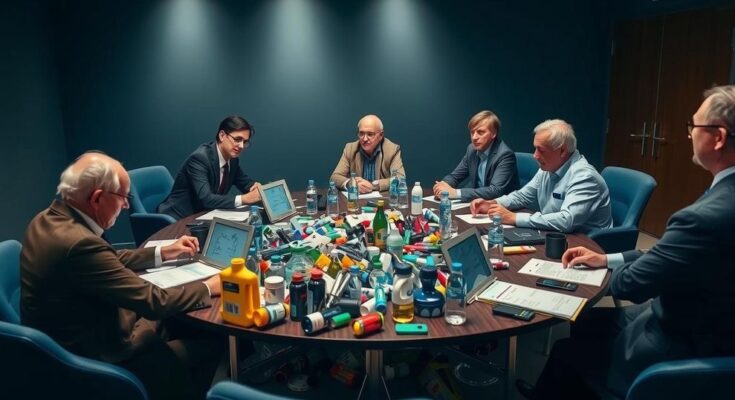Deep divisions characterized the opening of treaty negotiations aimed at curbing plastic pollution in Busan, South Korea. Nations expressed contention over key issues, including production limits and toxic chemical regulations. While there is a consensus on the urgency of the pollution crisis, a coherent pathway to address it remains contested, with political interests complicating potential agreements.
Deep divisions emerged at the opening of a final round of talks concerning a treaty to combat plastic pollution in South Korea’s Busan. The discussions commenced in the wake of a chaotic conclusion to the COP29 climate summit in Baku, where developing nations criticized inadequate financial commitments. Luis Vayas Valdivieso, the diplomat chairing the negotiations, emphasized the critical nature of the meeting, framing it as a vital response to an existential challenge.
Plastic pollution has permeated environments globally, with evidence found even in human breast milk. While there is widespread acknowledgment of its detrimental effects, consensus on potential solutions remains elusive. Key contentious topics include proposals to restrict plastic production, the potential prohibition of certain chemicals deemed toxic, and the funding mechanisms necessary for treaty implementation.
The document intended to guide negotiations, which exceeds seventy pages, has already received pushback from nations such as Russia and India, indicating significant discontent regarding representation in the proposed alternative. Eyad Aljubran, the head of the Saudi Arabia delegation, expressed that many nations felt overlooked. Moreover, recent production statistics indicate a staggering increase in plastic use, with projections suggesting that production will triple by 2060.
Countries aligned with the High Ambition Coalition advocate for a comprehensive approach addressing the entire lifecycle of plastics, promoting strategies that encourage reuse and recycling. Yet oil-producing countries largely favor focusing solely on waste management. This divergence of interests poses a significant challenge to reaching a consensus, especially given the urgency of environmental deteriorations linked to plastic pollution and emissions related to fossil fuel production.
Discussions are complicated further by the stance of major players such as the United States and China, who have not firmly aligned with either proposed framework, adding another layer of complexity to the negotiations. Environmental groups have voiced concerns regarding the potential dilution of the treaty due to significant political and industrial pressures. Nevertheless, the chief of the UN Environment Programme urged for patience and a commitment to establishing ambitious targets, noting that meaningful agreements often require time.
The rising global concern regarding plastic pollution necessitates international cooperation to strategically address the problem through a binding treaty. Recent statistics highlight that plastic production reached approximately 460 million tons in 2019 and is expected to increase substantially in the coming decades. This ecological crisis demands urgent action as plastic waste continues to infiltrate ecosystems and human health, prompting a need for a regulatory framework that unequivocally addresses the lifecycle of plastics.
The opening of the treaty negotiations in Busan reveals significant ideological divides among participating nations, reflecting differing priorities concerning plastic pollution management. While a majority indicate a desire for a robust treaty, political maneuvering, and the influence of fossil fuel interests could threaten the integrity of proposed agreements. The outcome of these discussions hinges on the participating nations’ ability to reconcile these differences and establish cooperative strategies toward effective plastic waste reduction and management.
Original Source: www.seychellesnewsagency.com




